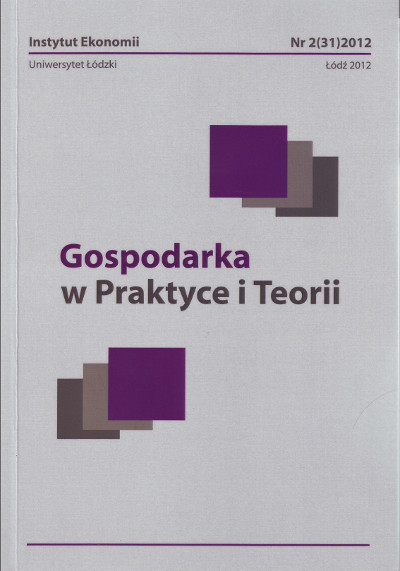Dual-process cognitive model and the heuristics in Daniel Kahneman and Amos Tversky's studies
DOI:
https://doi.org/10.18778/1429-3730.31.05Keywords:
heurystyki, ekonomia behawioralna, Daniel Kahneman, Amos Tversky, dualizm poznawczy, prawdopodobieństwo, kotwiczenie, teoria perspektywyAbstract
The paper conducts the collective specification of fallacies in the perception of reality made by market participants. It is based on the Daniel Kahneman and Amos Tversky’s esseys and it proves that the paradigm of rationality in human behaviour is actually a purely idealistic assumption and is often not reflected in the factual decisions made by consumers. The article pointed out numerous examples of so-called heuristics and biases, which cause the wrong estimation of the probability of certain events and thus are the reason of making non-optimal choices. The studies provide the evidence that unconscious, irrational, emotional and psychological factors are crucial in decision-making situations and to make the forecasts and projections more realistic they should be taken into account in the development of econometric models, business strategies or human resources management policy.
References
Bar-Hiller M., On the subjective probability of compound events, "Organizational Behavior and Human Performance", no.9, 1973
Google Scholar
DOI: https://doi.org/10.1016/0030-5073(73)90061-5
Baron R. A., Cognitive mechanisms in entrepreneurship: Why and when entrepreneurs think differently than other persons, "Journal of Business Venturing", no. 13, 1998
Google Scholar
DOI: https://doi.org/10.1016/S0883-9026(97)00031-1
Becker G. S., Ekonomiczna teoria zachowań ludzkich, PWN, Warszawa 199O
Google Scholar
Bernstein P. L., Przeciw bogom: Niezwykłe dzieje ryzyka, WIG PRESS, Warszawa 1997
Google Scholar
Busenitz L. W., Barney J. B., Differences between Entrepreneurs and Managers in Large Organizations: Biases and Heuristics in Strategic Decision-Making, "Journal of Business Venturing", no.12, 1997
Google Scholar
DOI: https://doi.org/10.1016/S0883-9026(96)00003-1
Carruthers P., Architecture for Dual Reasoning http://philosophy.umd.edu/Faculty/pcar-ruthers/Architecture%2Ofor%2ODual%2OReasoning.pdf
Google Scholar
Chapman L. J., Chapman J. P., Illusory correlation as an obstacle to the use of valid psychodiagnostic signs, "Journal of AbnormalPsychology", 1969, Vol.74, No.3
Google Scholar
DOI: https://doi.org/10.1037/h0027592
Cooper A. C., Woo C. Y., Dunkelberg W. C., Entrepreneurs' perceived chances for success," Journal of Business Venturing", Volume 3, Issue 2, Spring 1988
Google Scholar
DOI: https://doi.org/10.1016/0883-9026(88)90020-1
Czy nadchodzi kolejne tsunami w gospodarce? Deloitte, Warszawa 2O11 https://www.deloitte.com/assets/Dcom-Poland/Local%2OAssets/Documents/Raporty,%2Obadania,%2Orankingi/pl_BSI_6_PP.pdf
Google Scholar
Falkowski A., Tyszka T., Psychologia zachowań konsumenckich, Gdańskie Wydawnictwo Psychologiczne, Gdańsk 2OO1
Google Scholar
Falkowski A., Zaleśkiewicz T., Psychologia poznawcza w praktyce. Ekonomia, biznes, polityka, PWN, Warszawa 2O12
Google Scholar
Kahneman D., Maps of bounded rationality: a perspective on intuitive judgment and choice, Prize Lecture, December 8, 2OO2 http://www.nobelprize.org/nobel_prizes/econo-mics/laureates/2OO2/kahnemann-lecture.pdf
Google Scholar
Kahneman D., Tversky A., Judgment under Uncertainty: Heuristics and Biases, "Science", New Series, Vol. 185, No. 4157., Sep. 27, 1974
Google Scholar
DOI: https://doi.org/10.1126/science.185.4157.1124
Kahneman D., Tversky A., Prospect Theory: An Analysis of Decision under Risk, "Econometrica", 47(2), March 1979
Google Scholar
DOI: https://doi.org/10.2307/1914185
Kahneman D., Tversky A., Subjective probability: A judgment of representativeness. „Cognitive Psychology". No. 3 (3), 1972
Google Scholar
DOI: https://doi.org/10.1016/0010-0285(72)90016-3
Mill J. S., System logiki dedukcyjnej i indukcyjnej, t. 2, Warszawa 1962
Google Scholar
Mises L., Ekonomia i polityka, Fijor Publishing, Warszawa 2OO6
Google Scholar
Shefrin H., Statement M., The Disposition to Sell Winners Too Early and Ride Losers Too Long: The Theory and Evidence, Journal of Finance, 4O, 1985
Google Scholar
DOI: https://doi.org/10.1111/j.1540-6261.1985.tb05002.x
Simon H. A., Model of Man: Social and Rational, NY: Wiley, 1957
Google Scholar
DOI: https://doi.org/10.2307/2550441
Sloman S. A., The empirical case for two systems of reasoning, "Psychological Bulletin", no. 119, 1996
Google Scholar
DOI: https://doi.org/10.1037/0033-2909.119.1.3
Thaler R. H., Mental Accounting Matters," Journal of Behavioral Decision Making", 12, 1999
Google Scholar
DOI: https://doi.org/10.1002/(SICI)1099-0771(199909)12:3<183::AID-BDM318>3.0.CO;2-F
Tyszka T. (red.), Psychologia ekonomiczna, Gdańskie Wydawnictwo Psychologiczne, Gdańsk 2OO4
Google Scholar
Wilke W. L., Consumer Behavior, New York: Wiley, 1994
Google Scholar
Downloads
Published
How to Cite
Issue
Section
License
Copyright (c) 2012 Gospodarka w Praktyce i Teorii

This work is licensed under a Creative Commons Attribution-NonCommercial-NoDerivatives 3.0 Unported License.








